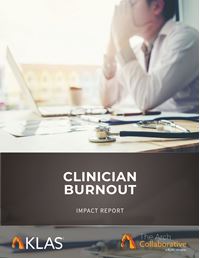Clinician Burnout
An Arch Collaborative Impact Report 2019
The Arch Collaborative’s primary focus is improving the EHR experience, and this experience involves the wellness of the clinician. Therefore, included in this study are two questions derived from the American Medical Association’s (AMA) Mini Z study. These two questions are correlated with the Maslach Burnout Inventory, which helps to properly identify when a clinician is burning out. All burnout findings in this report are shared through the lens of the impact of burnout on EHR satisfaction.This report is not a comprehensive analysis of the causes of clinician burnout, nor are its recommendations intended to be the primary solutions for this complex problem. Instead, this report is intended to show the developing relationship between burnout and EHR dissatisfaction. KLAS hopes the following insights add to a broader solution for taking care of those who continually offer care to others.
Access the feedback of
500,000+ clinicians worldwide
Access the feedback of
500,000+ clinicians worldwide
Here is my information:


Arch Collaborative data indicates that 28% of providers report some degree of burnout; this is a lower percentage than industry reports on burnout. One possible explanation for this is that organizations who participate in the Collaborative have already proved a willingness to measure their clinicians’ satisfaction and are therefore among the more progressive organizations in attempts to understand the daily experience of clinicians. This proactive approach and possible self-selection bias may make a difference in clinicians’ wellness experience.
A strong Net EHR Experience Score is correlated with lower burnout; the more satisfied providers in a certain organization are with their EHR, the less likely it is that many providers in that organization are experiencing burnout.

The second question asks, “What are the primary contributors to your feelings of burnout (if any)?” The most common contributor to provider burnout is too much time spent on bureaucratic tasks, followed by the impact of the EHR or other IT tools on efficiency, and then a heavy after-hours workload.

Key Takeaway
There is a correlation between clinicians’ Net EHR Experience Scores and burnout, but the Arch Collaborative has not seen an R2 greater than 0.2, indicating that at most, the EHR experience explains only 20% of the variation in clinician burnout. The takeaway from this report should be that burnout extends beyond the EHR. Best practices that lead to higher EHR satisfaction may help, but focusing solely on the EHR is unlikely to eliminate burnout.

Report Non-Public HTML Body
Report Public HTML Body
Featured in Learning Tracks
Topics
Report Topics
Burnout Reduction & Clinician Wellness, Clinician Relationships & Communication, EHR Governance, EHR Personalization, Ongoing EHR Education, Opioid Abuse Prevention, Peer GuidanceThis material is copyrighted. Any organization gaining unauthorized access to this report will be liable to compensate KLAS for the full retail price. Please see the KLAS DATA USE POLICY for information regarding use of this report. © 2019 KLAS Research, LLC. All Rights Reserved. NOTE: Performance scores may change significantly when including newly interviewed provider organizations, especially when added to a smaller sample size like in emerging markets with a small number of live clients. The findings presented are not meant to be conclusive data for an entire client base.



